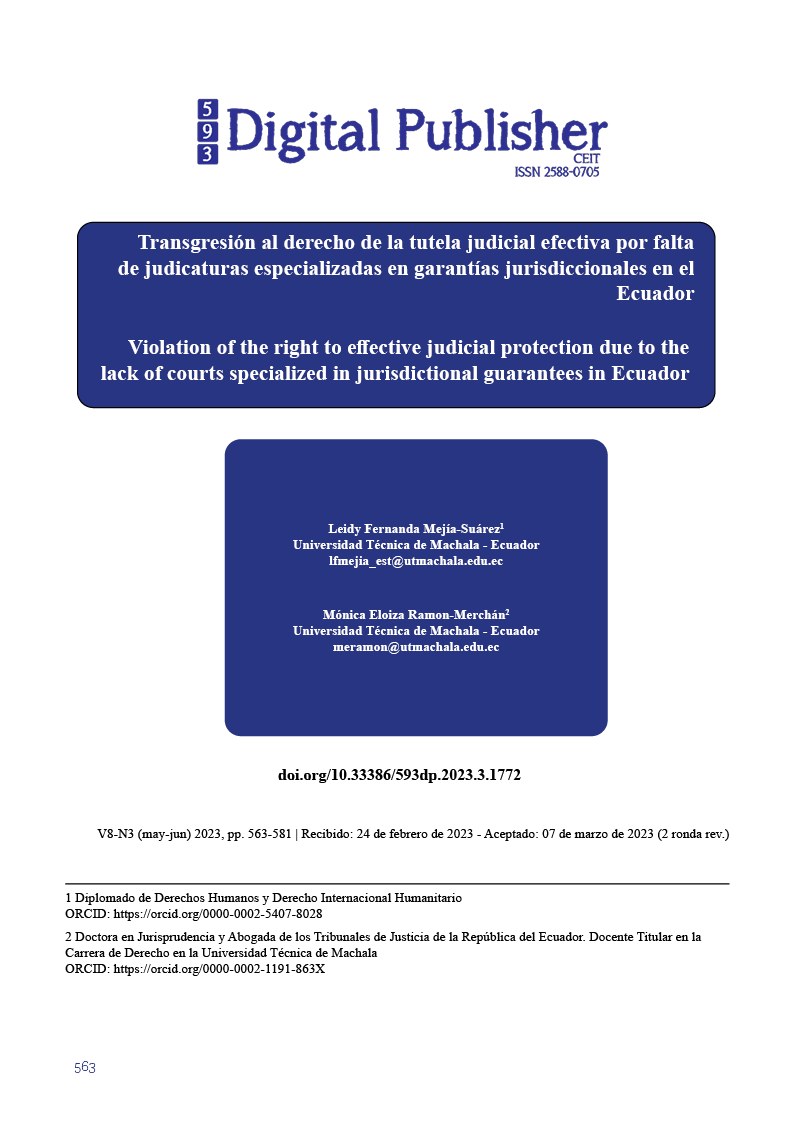Violation of the right to effective judicial protection due to the lack of courts specialized in jurisdictional guarantees in Ecuador
Main Article Content
Abstract
In this scientific article, a study has been carried out on the need to implement specialized courts in constitutional matters in the Ecuadorian State, in order to avoid the violation of the right to effective judicial protection and the principle of specialty enshrined in our legal regulations, due to the fact that jurisdictional guarantees, such as rights protection mechanisms, are activated only before any first instance judge of the place where the act or omission originates or where its effects are produced; Being this of any matter in accordance with the provisions of article 7 of the Organic Law of Jurisdictional Guarantees and Constitutional Control, this study was carried out through the compilation of bibliographic and jurisprudential information with the objective of publicizing the scope and core essential of the right to effective judicial protection and how important is the existence of judges specialized in constitutional matters through the creation of these courts.
Keywords: specialized courts, effective judicial protection, principle of specialty, jurisdictional guarantees, judges
Downloads
Article Details

This work is licensed under a Creative Commons Attribution-NonCommercial-ShareAlike 4.0 International License.
1. Derechos de autor
Las obras que se publican en 593 Digital Publisher CEIT están sujetas a los siguientes términos:
1.1. 593 Digital Publisher CEIT, conserva los derechos patrimoniales (copyright) de las obras publicadas, favorece y permite la reutilización de las mismas bajo la licencia Licencia Creative Commons 4.0 de Reconocimiento-NoComercial-CompartirIgual 4.0, por lo cual se pueden copiar, usar, difundir, transmitir y exponer públicamente, siempre que:
1.1.a. Se cite la autoría y fuente original de su publicación (revista, editorial, URL).
1.1.b. No se usen para fines comerciales u onerosos.
1.1.c. Se mencione la existencia y especificaciones de esta licencia de uso.
References
Aldana Zavala, J. J., & Isea, J. (2018). Derechos Humanos y Dignidad Humana. Iustitia Socialis: Revista Arbitrada de Ciencias Jurídicas y Criminalísticas, 3(4), 8-23. https://dialnet.unirioja.es/servlet/articulo?codigo=7049419
Andrade Ureña, R. F. (2022). Principios constitucionales no convencionales de aplicación en el derecho administrativo y énfasis en el derecho electoral ecuatoriano. Revista de políticas y problemas públicos, 1(14), 37-55. https://revistas.iaen.edu.ec/index.php/estado_comunes/article/view/241/431
Briones Núñez, N. D., Ortiz Samaniego, J. A., & Suqui Romero, G. Y. (2019). La vulneración a la tutela judicial efectiva por la imputación incorrecta de un delito. Revista Científica Mundo de la Investigación y el Conocimiento, 3(1), 126-150. doi:https://doi.org/10.26820/recimundo/3.(1).enero.2019.126-150
Cevallos Sánchez, G., & Alvarado Moncada, Z. (2018). Tutela judicial efectiva y la relación con el principio de inmediación. Revista Universidad y Sociedad, 10(1), 168-173. http://scielo.sld.cu/scielo.php?script=sci_arttext&pid=S2218-36202018000100168&lng=es&tlng=es.
Chugá Quemac, R. E., Proaño Tamayo, D. S., & Méndez Cabrita, C. M. (2021). El plazo razonable como elemento constitutivo de la tutela judicial efectiva. Dilemas contemporáneos: educación, política y valores, 9, 1-26. doi:doi:https://doi.org/10.46377/dilemas.v9i.3006
Código Orgánico de la Función Judicial. (2009). Última reforma: Edición Constitucional del Registro Oficial 12. Quito.
Constitución de la República del Ecuador. (2008). Registro Oficial 449 de 20 de octubre de 2008.
Convención Americana sobre Derechos Humanos. (1969). https://www.refworld.org.es/docid/57f767ff14.html
Cubillo López, I. J. (2018). El Derecho a La Tutela Judicial Efectiva Y El Derecho a La ejecución En La Jurisprudencia Constitucional. Estudios de Deusto, 66(2), 347-372. https://revista-estudios.revistas.deusto.es/article/view/1531/1861
Estrada Marún, J. A., & Esquivel Alonso, Y. (2019). La designación de los jueces de la Corte Constitucional italiana. Boletín Mexicano de Derecho Comparado, 52(154), 39-75. doi:doi:https://doi.org/10.22201/iij.24484873e.2019.154.14137
Gaibor Gaibor, P. M. (2012). Las Garantías Jurisdiccioales en el Marco Constitucional Ecuatoriano. Guayaquil, Ecuador.
García Falconí, J. C. (2009). Los principios rectores y disposiciones fundamentales que se deben observar en la administración de justicia en el ecuador según el Código Orgánico De la Función Judicial. 478.
Garza de la Vega, D. A., & Álvarez González, C. (2019). Análisis holístico de la argumentación y la motivación de la Sentencia según el derecho procedimental. Revista General de Derecho Procesal(47), 12-37. https://dialnet.unirioja.es/servlet/articulo?codigo=6862759
Grimm, D. (2018). A la búsqueda de la aceptación. El déficit y las fuentes de legitimidad de la Uniòn. Revista de derecho constitucional europeo, 247-260. https://dialnet.unirioja.es/servlet/articulo?codigo=6525571
Guzmán Chávez, M. R. (2019). El principio constitucional de la tutela judicial efectiva vulnerado por la acción de nulidad de sentencias. Iustitia Socialis: Revista Arbitrada de Ciencias Jurídicas y Criminalísticas, 4(7), 135-145. https://dialnet.unirioja.es/servlet/articulo?codigo=7049450
Ley Orgánica de Garantías Jurisdiccionales y Control Constitucional. (22 de octubre de 2009). Registro Oficial 52.
Manchado Castillo, W. L. (2018). El principio de especialidad aplicado en los casos de tenencia de niñez y adolescencia y su afectación al derecho de motivación. Universidad Andina Simón Bolívar. https://repositorio.uasb.edu.ec/bitstream/10644/6171/1/T2599-MDE-Machado-El%20principio.pdf
Orellana Crespo, G. C., & Pinos Jaén, C. E. (2021). Las garantías constitucionales durante el estado de excepción en el contexto de la pandemia COVID-19, en Ecuador. Polo del Conocimiento, 1110-1132. https://polodelconocimiento.com/ojs/index.php/es/article/view/2213/0
Ossorio, A. (2011). El alma de la toga. Bolivia: Multilibro Un Mundo de Cultura.
Peiteado Mariscal, P. (2018). Consideraciones sobre la relación entre el derecho a la tutela judicial efectiva y la mediación obligatoria. Estudios Deustos, Revista de Derecho Público, 66(2). doi:https://doi.org/10.18543/ed-66(2)-2018pp283-322
Pinho De Oliveira, M. F. (2021). Breve análisis sobre la tutela de los Derechos Humanos en el Orden Constitucional Venezolano. Novum Jus, 15(2), 153-176. doi:https://doi.org/10.14718/novumjus.2021.15.2.6
Rivera Silva, T. V., & Correa Calderón, J. E. (2021). La motivación de las sentencias constitucionales como garantía del derecho al debido proceso. Revista Dilemas Contemporáneos: Educación, Política y Valores, 9, 1-20. doi:https://doi.org/10.46377/dilemas.v9i.3021.
Rosero Morán, C. M. (2021). Sistemas de designación de jueces que integran cortes o tribunales constitucionales: Incidencia en la democracia, méritos y populismo al inescindible panconstitucionalismo en Ecuador. Dilemas contemporáneos: educación, política y valores, 9, 1-35. doi:https://doi.org/10.46377/dilemas.v9i.2983
Sentencia de la Corte Constitucional del Ecuador . (14 de mayo de 2013). Nro. 030-13-SCN-CC. Pichincha. https://portal.corteconstitucional.gob.ec/FichaRelatoria.aspx?numdocumento=030-13-SCN-CC
Sentencia de la Corte Constitucional del Ecuador. (22 de marzo de 2016). Nro. 0530-10-JP. https://portal.corteconstitucional.gob.ec/FichaCausa.aspx?numcausa=0530-10-JP
Sentencia de la Corte IDH, Caso Castillo Petruzzi y Otros Vs Perú (30 de mayo de 1999).
Sentencia de la Corte IDH, Caso Cantos Vs. Argentina (28 de noviembre de 2002).
Sentencia de la Corte IDH, Caso Acevedo Jaramillo y Otros Vs Perú (07 de febrero de 2006).
Sentencia de la Corte IDH, Caso Pueblo Saramaka vs. Surinam (28 de noviembre de 2007).
Sentencia de la Corte IDH, Caso Bayarri vs. Argentina (30 de octubre de 2008).
Sentencia de la Corte IDH, Caso Barbani Duarte y Otros Vs Uruguay (13 de octubre de 2011).
Valmaña Valmaña, S. (2018). La tutela judicial efectiva como derecho fundamental y protección jurisdiccional. UNED, 1-25. https://www2.uned.es/ca-tortosa/Biblioteca_Digital/Biblio/Valmana/La%20Tutela.pdf



